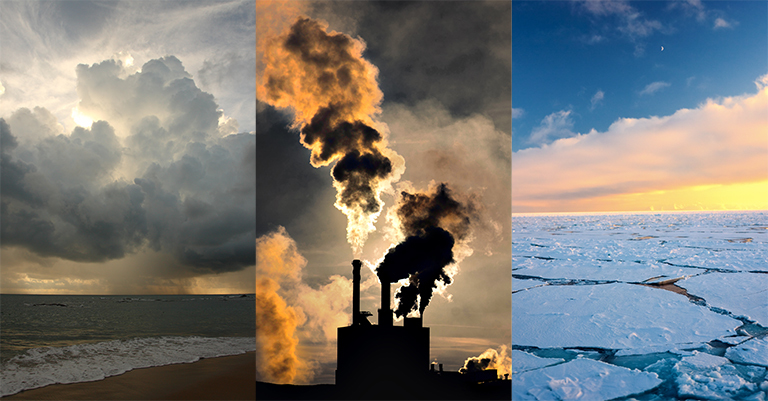It’s something that has affected the world since the Industrial Revolution. High temperatures. Dry spells. Surging storms. Wildfires. This world pandemic does not come in the form of a disease; instead, it spreads as fast as a virus. What is it?
Global warming.
In short, global warming is a gradual increase in the average temperature of the earth’s surface, oceans, and atmosphere caused by burning fossil fuels. These fuels emit carbon dioxide, a greenhouse gas, into the atmosphere, trapping heat and thus raising the globe’s temperature.
Over the past 100 years, the world temperature has increased by 1.4 degrees Fahrenheit, which might not seem like much, but it does have significant impacts. Regarding the climate, weather patterns and conditions have become more extreme. Here are just a few of the many effects:
- Glaciers melting- There is now 10 percent less permanently frozen ground, permafrost, in the Northern hemisphere than in the early 1900s, and this thawing causes landslides and avalanches. In Montana’s Glacier National Park, only 25 glaciers bigger than 25 acres exist, compared to a whopping 150 glaciers earlier in history. According to a 2016 study by Nature Geoscience, the likelihood of these changes being related to human activity is 99 percent.
- Rising sea levels and temperatures- Due to the melting of glaciers, sea levels worldwide have risen 4.4 millimeters per year since 2013 and 8 inches since 1870. These new levels make coastal areas, where nearly half of the human population lives, susceptible to more flooding and damage. As sea temperatures increase due to the greenhouse effect, tropical storms can form into more powerful hurricanes.
- Droughts and wildfires- Due to the overall increase in heat, water shortages and raging fires have become more prominent in places such as western America. In 2015, scientists came to the conclusion that one of California’s worst droughts was intensified by 15-20 percent because of global warming. If there is little to no rainfall in these areas, the likelihood of wildfires occurring is significantly higher.
- Ecosystems- Because of the heat, some species of animals have been forced to move further north or to a higher altitude where there are cooler climates. The warmer temperatures have also increased the range of diseases only located in tropical or subtropical areas, which could kill off any plants or animals that were formally protected. A study completed by the journal Proceedings of the National Academy of Sciences suggests that one in every three species of plants and animals are at risk of extinction by 2070 due to climate change and global warming.
- Social- All agriculture systems will take a big hit by the effects of climate change. Droughts, high temperatures, severe storms, lower groundwater levels, and biodiversity loss can lead to crop failures and livestock shortages. Civil unrest and political instability can occur without this food security. Remember that, in the simplest terms, all of this is still caused by that one problem: global warming. Although one might not think a rise in temperatures can affect a political system, it indirectly does, through a large chain reaction.
What is being done, and what can be done to help the issue?
Currently, our nation is in the Paris Climate Agreement, an international treaty helping prevent climate change. The U.S. has cut back on carbon pollution to prevent the average global temperature from rising above 1.5 degrees Celcius since anything above 2 degrees can be catastrophic to the climate.
The American automobile industry is one of the leading industries that have paved the way for new energy and fuel efficiency, two critical methods of tackling climate change. The goal is to put more zero emissions (without fossil fuel) vehicles on the road.
There are many ways people can do their part to help with global warming:
- Use renewable energy inside of homes- have energy-efficient appliances, solar panels on roofs, etc.
- Reduce the amount of water waste- take shorter showers, turn off the water when not in use, etc.
- Eat the food you buy, and don’t buy what you won’t eat and will go to waste.
Though global warming may seem like a huge hurdle, the world can jump over it, so long as everyone educates themselves on the topic and how to help our world.
You may also like:
-
Golden Globes 2024: Hollywood’s typical night of fun turned sour
-
Second Chapter: Gypsy Rose Blanchard navigates new life after prison
-
Executives transform stuffed animals with a plushy revolution
-
Man Attempts to Cross Atlantic Ocean in a Homemade Hamster Ball
-
The Paqui One Chip Challenge has returned with deadly results
